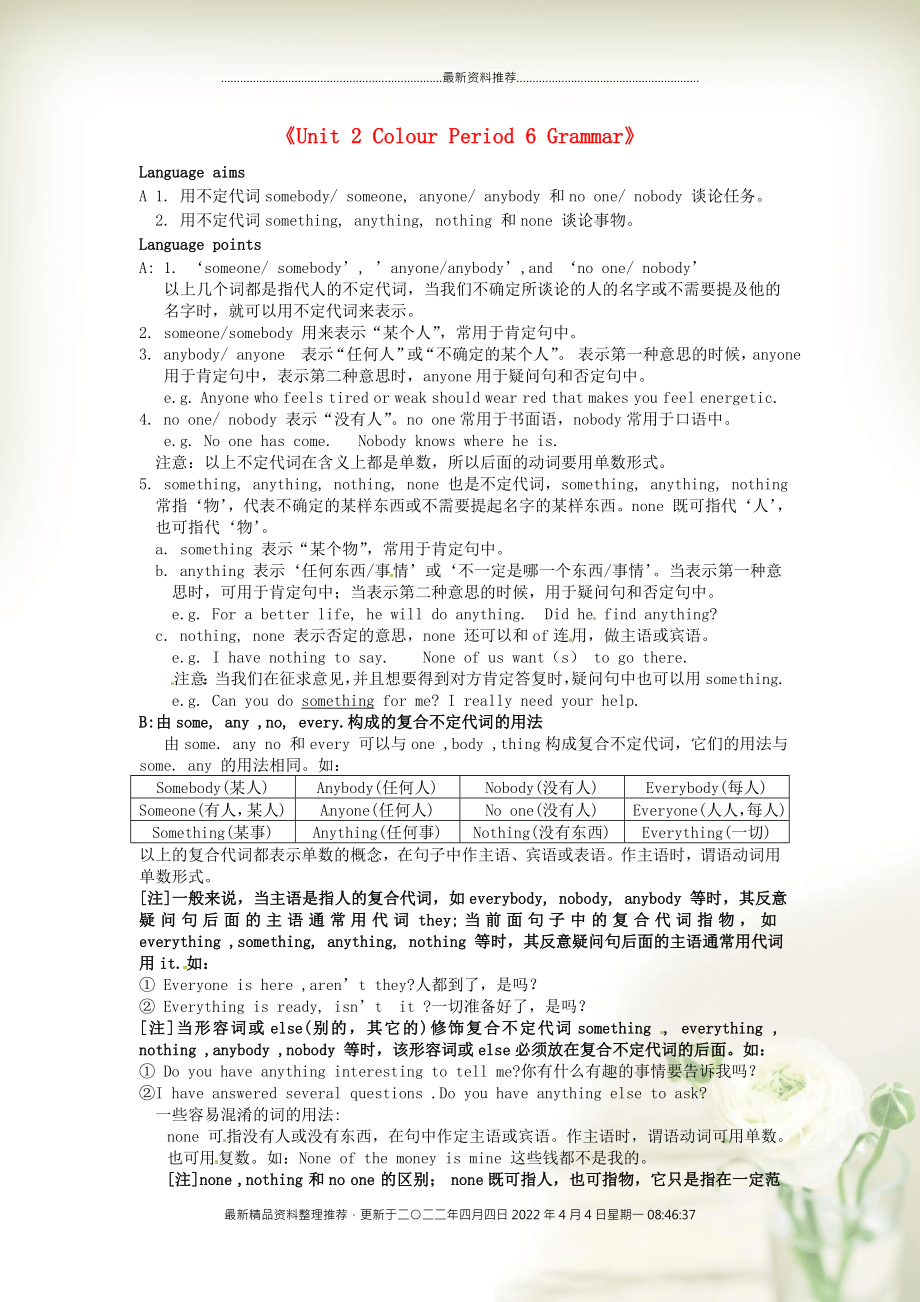《江蘇省東臺市唐洋鎮(zhèn)中學(xué)九年級英語上冊《Unit 2 Colour Period 6 Grammar》教案 牛津版》由會員分享�����,可在線閱讀����,更多相關(guān)《江蘇省東臺市唐洋鎮(zhèn)中學(xué)九年級英語上冊《Unit 2 Colour Period 6 Grammar》教案 牛津版(2頁珍藏版)》請在裝配圖網(wǎng)上搜索�。
1、……………………………………………………………最新資料推薦…………………………………………………
《Unit 2 Colour Period 6 Grammar》
Language aims
A 1. 用不定代詞somebody/ someone, anyone/ anybody 和no one/ nobody 談?wù)撊蝿?wù)����。
2. 用不定代詞something, anything, nothing 和none 談?wù)撌挛铩?
Language points
A: 1. ‘someone/ somebody’, ’anyone/anybody’,and ‘no one/ nobody
2、’
以上幾個詞都是指代人的不定代詞�,當(dāng)我們不確定所談?wù)摰娜说拿只虿恍枰峒八拿謺r,就可以用不定代詞來表示���。
2. someone/somebody 用來表示“某個人”�����,常用于肯定句中���。
3. anybody/ anyone 表示“任何人”或“不確定的某個人”。 表示第一種意思的時候�,anyone用于肯定句中,表示第二種意思時����,anyone用于疑問句和否定句中。
e.g. Anyone who feels tired or weak should wear red that makes you feel energetic.
4. no one/ nobody 表示“沒
3���、有人”����。no one常用于書面語,nobody常用于口語中�。
e.g. No one has come. Nobody knows where he is.
注意:以上不定代詞在含義上都是單數(shù),所以后面的動詞要用單數(shù)形式�。
5. something, anything, nothing, none 也是不定代詞,something, anything, nothing 常指‘物’�,代表不確定的某樣?xùn)|西或不需要提起名字的某樣?xùn)|西。none 既可指代‘人’�,也可指代‘物’。
a. something 表示“某個物”�,常用于肯定句中。
b. anything 表示‘任何東西/事情’或‘
4����、不一定是哪一個東西/事情’。當(dāng)表示第一種意思時�����,可用于肯定句中����;當(dāng)表示第二種意思的時候,用于疑問句和否定句中��。
e.g. For a better life, he will do anything. Did he find anything?
c. nothing, none 表示否定的意思�����,none 還可以和of連用,做主語或賓語��。
e.g. I have nothing to say. None of us want(s) to go there.
注意:當(dāng)我們在征求意見���,并且想要得到對方肯定答復(fù)時,疑問句中也可以用something.
e.g. Can you do
5���、something for me? I really need your help.
B:由some, any ,no, every.構(gòu)成的復(fù)合不定代詞的用法
由some. any no 和every 可以與one ,body ,thing構(gòu)成復(fù)合不定代詞�����,它們的用法與some. any 的用法相同��。如:
Somebody(某人)
Anybody(任何人)
Nobody(沒有人)
Everybody(每人)
Someone(有人���,某人)
Anyone(任何人)
No one(沒有人)
Everyone(人人,每人)
Something(某事)
Anything(任何事)
6����、
Nothing(沒有東西)
Everything(一切)
以上的復(fù)合代詞都表示單數(shù)的概念,在句子中作主語����、賓語或表語�。作主語時���,謂語動詞用單數(shù)形式����。
[注]一般來說�����,當(dāng)主語是指人的復(fù)合代詞�����,如everybody, nobody, anybody 等時���,其反意疑問句后面的主語通常用代詞they;當(dāng)前面句子中的復(fù)合代詞指物��,如everything ,something, anything, nothing 等時�,其反意疑問句后面的主語通常用代詞用it.如:
① Everyone is here ,aren’t they?人都到了����,是嗎�?
② Everything is ready,
7���、isn’t it ?一切準(zhǔn)備好了�,是嗎��?
[注]當(dāng)形容詞或else(別的����,其它的)修飾復(fù)合不定代詞something , everything , nothing ,anybody ,nobody 等時���,該形容詞或else必須放在復(fù)合不定代詞的后面�。如:
① Do you have anything interesting to tell me?你有什么有趣的事情要告訴我嗎����?
②I have answered several questions .Do you have anything else to ask?
一些容易混淆的詞的用法:
none 可指沒有人或沒有東西,在句中作定
8��、主語或賓語�����。作主語時����,謂語動詞可用單數(shù)�����。也可用復(fù)數(shù)�。如:None of the money is mine 這些錢都不是我的��。
[注]none ,nothing 和no one 的區(qū)別�; none既可指人,也可指物���,它只是指在一定范圍內(nèi)���,代替上下文已出現(xiàn)過的名詞。Nothing表示“沒有什么東西”�����,只能指物�,不能指人,同時沒有任何限制�。No one 一般用來指人,使用時不受一定范圍的限制�����,后面一般不接引導(dǎo)的介詞短語.另外anyone 不與動詞的否定形式連用,如果要表示否定意義�����,則必須用no one 和none.
e.g. None of the boys likes climbing hi
9�、lls.這些男孩中沒有一個人喜歡爬山。
No one in our class can answer this question.我們班上沒有人能回答這個問題��。
Teaching steps
Step 1 Revision
Review the last lesson.
Step 2 Learning
Learn the indefinite pronouns.(Give some examples if necessary.)
Step 3 Practice
Finish off the exercises on the workbook.
Step 4 Conso
10�、lidation
Finish off the exercises on papers.
Step 5 Homework
Review the grammar and preview the next grammar.
Exercises
A��、單項選擇
( )1.At weekends Millie prefers _____ at home to _____ out.
A. stay, going B. staying ,go C. staying ,going D .to stay, go
( )2.The children prefe
11����、rred _____ there rather than _____ a bus.
A. to walk, to take B. walking ,taking
C. to walk, take D. walking ,take
( )3.---Do you have any eggs in the fridge? ---No._____ is left.
A. some B. anything C. one D. none
( )4.Why __
12、___ go to the school library with us?
A. don’t you B. do you C. don’t you to D. do you to
( )5.The visiting professor ____giving lectures to students ____invited to a meeting at times.
A. preferred, to being B. preferred, rather than
C. preferred, than being
13�����、 D. preferred to , to being
( )6.Rather than _____ to school by bus, I preferred _____ a bike.
A .to go, to ride B. go ,riding C. going, to ride D. go ,to ride
( )7.---Is your father badly ill? ---No,_____ .Only a little cold.
A. serious anything B .serious nothing C
14�、. nothing serious D. anything serious
B、用所給詞的適當(dāng)形式填空
(1) He would rather________(go) there on foot than take a bus.
(2) Daniel would rather play football than_________(play) basketball.
(3) I prefer __________(see)the beautiful view to playing games.
(4) She prefers a ___________(colour) coat t
15�、o a black coat.
(5) On Sunday both of us prefer_________(stay )at home to_________(go) shopping.
(6) ---How beautiful the room is decorated! Did __________help you?
---I did it by myself ._________helped me .I didn’t need _________help.(somebody)
(當(dāng)堂檢測效果:_________________)
最新精品資料整理推薦���,更新于二〇二二年四月四日2022年4月4日星期一08:46:37
 江蘇省東臺市唐洋鎮(zhèn)中學(xué)九年級英語上冊《Unit 2 Colour Period 6 Grammar》教案 牛津版
江蘇省東臺市唐洋鎮(zhèn)中學(xué)九年級英語上冊《Unit 2 Colour Period 6 Grammar》教案 牛津版

